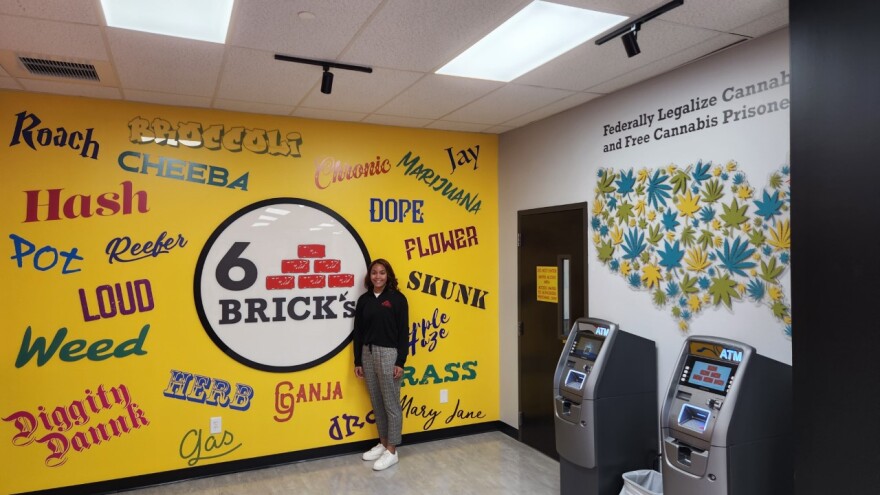Payton Shubrick, founder of 6Brick’s, a cannabis retailer in Springfield, Massachusetts, in front of the word cloud wall that is one of several references to the history of marijuana inside the store.
The five-year old legal marijuana industry in Massachusetts is closing in on $4 billion in total sales, but the boom times may be over.
Falling cannabis prices resulting from a big increase in wholesale supply and more retail competition will put pressure on their bottom lines, representatives of marijuana businesses in Springfield told City Councilors earlier this month.
“We expect 2023 to become very difficult,” said Steve Reilly, general counsel at Insa, which operates a recreational marijuana store on West Columbus Ave in Springfield’s Metro Center and a medical cannabis dispensary in East Springfield. He testified at a hearing held by the City Council’s Economic Development Committee.
“I’m not sure Massachusetts has struck the right balance between supply and demand on product and we anticipate a very difficult retail environment for 2023,” Riley said. “We are very cautious about the Massachusetts market going forward.”
His concerns about the Massachusetts market were echoed by Jamie Ware, a senior vice president at Holistic Industries, which operates the Liberty cannabis store on Boston Road in Springfield.
“Market compression is a huge challenge and we are just going to do the best we can to continue to serve the patients and consumers that we do in Massachusetts but we do expect 2023 to be a hard year,” she said.
The Insa and Liberty stores both opened in 2021. That year in November the average retail price for a gram of marijuana flower was $13.29, according to the state’s Cannabis Control Commission. A year later the average price had plummeted to $8.07.
As the newest entry into the retail marijuana business in Springfield, 6 Brick’s, which opened last September is in a different place. The store is not part of a larger company with operations in other states, explained founder and CEO Payton Shubrick.
“I am not vertically integrated,” Shubrick said, adding that her business is “still in the phase of brand awareness and customer acquisition.”
A discussion about later operating hours led City Councilor Melvin Edwards, chair of the Economic Development Committee, to say he’ll urge his colleagues to consider changing the zoning law that requires marijuana stores in Springfield to close by 9 p.m.
“This industry needs support,” Edwards said. “ Your contributions to our taxes and employment of our residents are important.”
The effective tax rate on recreational marijuana sales in Massachusetts is 20 percent. Last year the total tax collected was $284 million.
Additionally, Springfield levies a 3 percent impact fee and as of last November had $798,000 in a fund that is to be used to benefit neighborhoods that were adversely affected by the war on drugs. City Council President Jesse Lederman this month appointed an ad hoc committee to recommend how the money should be spent.
In 2018, Massachusetts was the only state east of the Mississippi where adults could legally purchase marijuana for recreational use, but now every border state except New Hampshire has opened cannabis stores — meaning its likely there will be fewer out-of-state shoppers this year.
A new law passed in Massachusetts last year will mean a new marijuana business opportunity – social consumption sites. Regulations proposed by the Cannabis Control Commission would authorize a pilot venue in Springfield.
H/T: www.wamc.org




